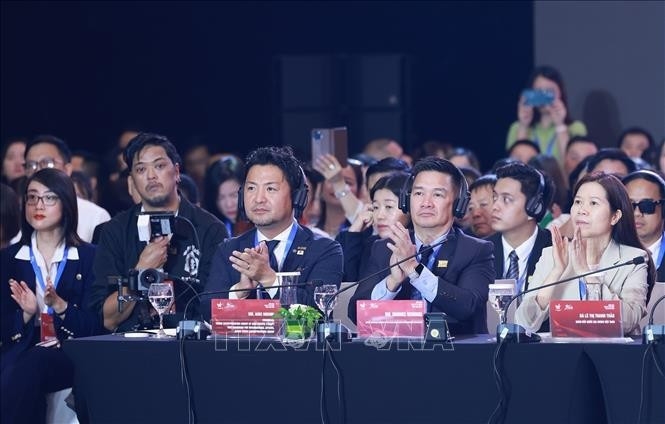The dialogue formed part of the Vietnam Private Sector Forum (VPSF) 2025, which gathered nearly 1,000 participants and featured vibrant panel discussions showing a panorama of the business community’s aspirations and innovation efforts.
    |
 |
|
Participants in the high-level dialogue of the Vietnam Private Sector Forum (VPSF) 2025 |
VPSF 2025 focused on four strategic pillars: institutions, technology, domestic capacity, and public - private partnership. Participants emphasized that Vietnamese enterprises’ ambition to go global can only be realized when it is supported by transparent and stable policies and a favorable legal environment enabling their sustainable, proactive, and innovative growth.
Mai Huu Tin, former Chairman of the Vietnam Young Entrepreneurs Association, stressed the need for national-level public - private partnership initiatives to help Vietnamese businesses truly expand internationally.
Proposed measures included simplifying procedures for certificates of origin and value-added tax (VAT) refunds, shifting from comprehensive control to risk-based post-clearance checks to reduce compliance costs, and investing in logistics infrastructure, cold storage, specialized ports, and supply chain connectivity to boost competitiveness.
Enterprises also called for simplified procedures to establish and operate high-tech agricultural zones in a way similar to industrial zones', and entrust such zones to the private sector.
Regarding international trade promotion, delegates proposed allocating budgets based on value-added contributions, prioritizing key industry associations, supporting brand promotion for key agricultural products, and strengthening public - private cooperation in brand building.
In terms of support policies, businesses underlined the need for expanding green credit and non-collateral concessional loans for circular agriculture projects, facilitating their participation in national key projects, and fostering alliances among Vietnamese enterprises as well as regional cooperation with ASEAN, Chinese, Japanese, and Republic of Korean partners. These solutions were seen as both growth enablers and contributions to enhancing Vietnam’s role in global value chains.
On institutional reform, Luu Thi Thanh Mau, Vice Chairwoman of the Vietnam Young Entrepreneurs Association, highlighted the importance of a legal system that is accessible and easy to comply with, along with a truly accommodating and enabling administrative apparatus. She also proposed codifying major resolutions into law to ensure stability and enforcement, providing businesses with confidence to invest and grow.
Truong Ly Hoang Phi, Vice President of the Ho Chi Minh City Young Entrepreneurs Association, underscored the need for breakthrough mechanisms for the Science and Technology Development Fund, reasonable tax deductions for R&D, and above all, a more open legal framework for piloting new models, steps crucial to positioning Vietnam as a regional technology hub.
On strengthening internal capacity, Tran Bang Viet, founder and CEO of Dong A Solutions, proposed building an R&D ecosystem, a national talent strategy, improved corporate governance, and fundamental credit policy reforms for SMEs. Such measures, he noted, will equip Vietnamese businesses to withstand economic fluctuations while preparing resources for long-term growth.
VPSF 2025, a national-level policy, dialogue, and action event, is organized by the Vietnam Young Entrepreneurs Association from July to September 2025.
Source: VNA